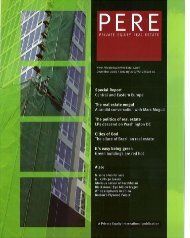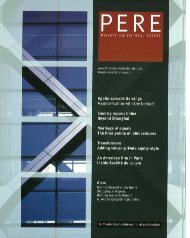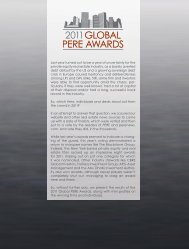2010AWARDS & AnnuAL REVIEW - PERE
2010AWARDS & AnnuAL REVIEW - PERE
2010AWARDS & AnnuAL REVIEW - PERE
Create successful ePaper yourself
Turn your PDF publications into a flip-book with our unique Google optimized e-Paper software.
oundtABle | AsiA<br />
(L to R) Khoo, Brasse, Price and Ren: China’s policy becoming increasingly important<br />
Sino watching<br />
An excerpt from <strong>PERE</strong>’s Asia roundtable in november found participants focused as<br />
much on events in China’s economy as those in the us<br />
For the previous two years, <strong>PERE</strong> roundtable participants felt<br />
obligated to temper their optimism about Asia’s growth story<br />
with less-encouraging economic events transpiring in the<br />
West. And with this year’s roundtable taking place one day<br />
after the US Federal Reserve announced a second attempt to<br />
resuscitate America’s flailing economy, it seemed the trend<br />
might continue.<br />
Indeed, news of the Fed’s plan for an additional $600 billion<br />
in quantitative easing, dubbed QE 2, would have caused<br />
serious ripples in 2009. Not so last year, as the participants<br />
were more conscious about China’s economic policy.<br />
“The amount of money the US government is pumping<br />
into the system potentially has negative consequences for<br />
all of Asia’s markets, specifically China,” said Richard Price,<br />
chief executive officer for Asia at ING Real Estate Investment<br />
Management (REIM). “But if you boil it down, what happens<br />
to China is really going to drive what happens globally. If<br />
the Chinese economy falls out of bed, then all bets are off<br />
world-over.”<br />
Rong Ren, chief executive officer of China-focused Harvest<br />
Capital Partners, pointed out that reactions to the US<br />
stimulus demonstrated just how Hong Kong, traditionally<br />
an economic sentiment conduit between the West and East,<br />
was becoming more closely pegged to Shanghai than New<br />
York. “People are realising that Asia’s economies are now<br />
more closely aligning with each other,” he said. “You cannot<br />
divorce the East from the US, but the impact from the West<br />
is becoming smaller.”<br />
These macroeconomic insights kicked off a discussion of<br />
the most pertinent topics and issues relevant to the private<br />
equity real estate industry in Asia today. Price, Ren and a<br />
58 <strong>PERE</strong> | 2010 AwArds & AnnuAl review<br />
third participant – AXA Real Estate’s global head for Asia,<br />
Frank Khoo – discussed investor appetite, investment trends,<br />
financing and real estate market fundamentals, all of which<br />
the US would barely figure into again. Instead, the one country<br />
firmly melded into their narrative montage of insights,<br />
anecdotes and metaphors was the People’s Republic of China.<br />
Ren described global reactions to Chinese exports, a traditional<br />
barometer for the health of the country’s economy,<br />
to underline his point. “When Lehman Brothers collapsed,<br />
China’s government was nervous about the effect on exports<br />
to the West,” he noted. A member of China’s Central<br />
Bank committee at the time, he recalled: “They questioned<br />
whether people would still buy China’s products. One quarter<br />
later, customs office data showed exports had increased<br />
22 percent.”<br />
Nobody at the table would say China has or would decouple<br />
from the US. But with policymakers in Beijing wheeling<br />
out measures to stem growth while their counterparts in the<br />
West introduced stimulators, all were convinced they are in<br />
the right region to ply their trade.<br />
Even though real estate sits centre in China’s efforts to cool<br />
its economy, each participant maintained that the country<br />
remained firmly at the centre of their firms’ long-term investment<br />
strategies. Furthermore, they weren’t perturbed by media<br />
noise about bubbles, particularly in the residential sector.<br />
“I’ve heard of apartments going for $23 million,” Price<br />
said. “Those apartments are overpriced, but it doesn’t mean<br />
there’s a bubble. We spend an awful lot of time analysing data<br />
to really understand supply, demand and structural drivers,<br />
and China’s markets will largely remain very robust for as<br />
long as we can forecast.”







